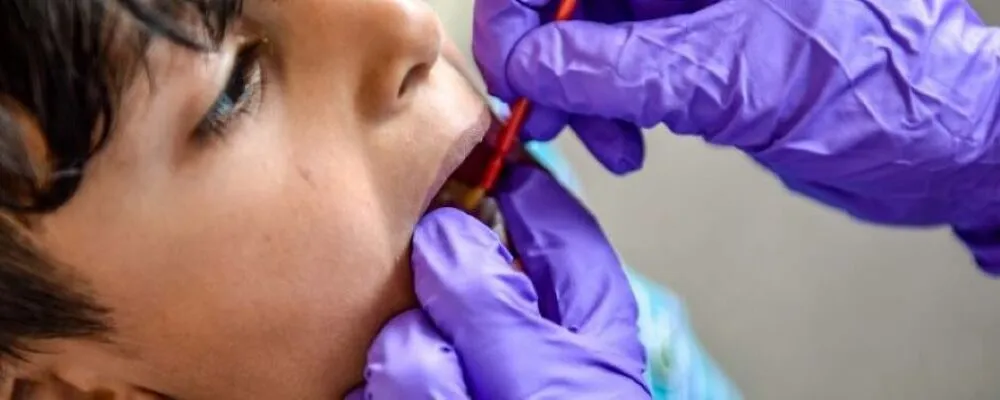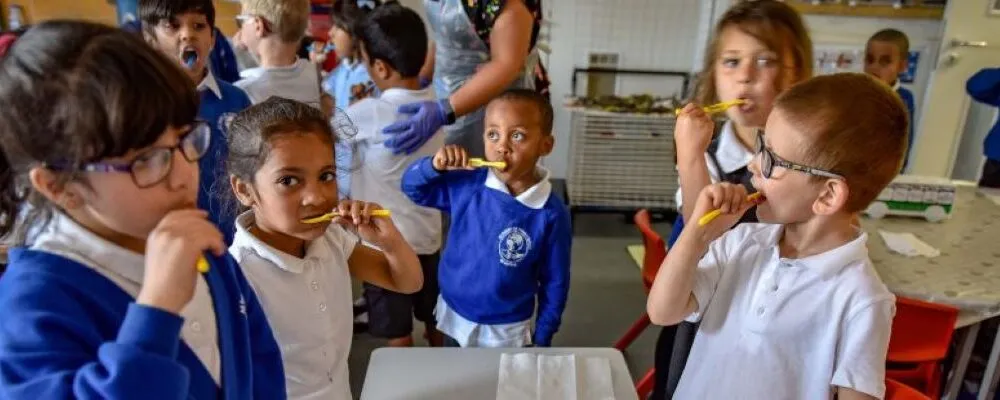Our services
Oral Health Improvement

About the service
The Oral Health Improvement team works to promote and improve oral health and prevent dental decay in local communities in Bradford and Airedale. We work together with a wide range of professionals, voluntary and community groups to deliver:
- advice, support and online training to encourage good oral health, particularly to key groups such as children, vulnerable adults and older people.
- supervised toothbrushing programme to promote good technique and daily fluoride toothpaste use for children aged four to six years in specific schools, nurseries and special schools (see tab below for more information)
- fluoride varnish programme to reduce tooth decay in children between the age of three to five years (see tab below for more information)
- oral health awareness campaigns.
We have a particular focus on improving children’s oral health, highlighting the importance of preventing dental decay from birth up to 19 years old.
How to access
Please contact the team on the number below if you would like to discuss taking part in an oral health programme.
If you need to find an NHS dentist, please visit the NHS Choices website or, if you need urgent or emergency dental care, please contact NHS 111.
How to find us
We are based at Westbourne Green Health Centre, 50 Heaton Road Bradford, BD8 8RA.
Contact
You can contact the Oral Health Improvement team on 01274 259084 or 01274 259085
Alternatively, please email: ohp@bdct.nhs.uk
Use the tabs below to explore this section further.
What to expect
Expert, evidence-based oral health programmes delivered by qualified dental staff.
Fluoride varnish programme

What is the fluoride varnish programme?
Aiming to reduce tooth decay in children, the fluoride varnish programme is delivered across the district for children between the age of three to four years via early years settings and schools. Children receive two applications of fluoride varnish over a one-year period (once every six months) from our oral health champions, who are trained in all aspects of oral health.
Do I need to consent to this?
Yes, parental consent is required. The positive consent form is only required to be completed once to receive two applications of fluoride. Following the initial application, parents / carers will be asked to notify the oral health improvement team of changes to their child’s medical history for subsequent applications.
What is fluoride varnish?
Fluoride varnish is a golden gel which is applied using a soft brush. It sets quickly and has a pleasant taste and fruity smell.
What does fluoride varnish do?
It makes the tooth surface stronger to help protect against decay when combined with regular daily toothbrushing with a fluoride toothpaste. Fluoride varnish wears off with brushing and eating so needs to be reapplied.
Can my child eat before the fluoride varnish application?
Yes, we advise that, if possible , a meal is eaten before the fluoride varnish application.
How is fluoride varnish applied?
The oral health champions will check your child’s teeth and using a small brush will paint on the fluoride varnish.
Can I be present when fluoride varnish is applied?
Yes. The oral health champions are happy for you to be there if you feel this would make things easier for your child.
Can my child eat after the fluoride varnish application?
We advise no food or drink for at least 30 minutes, and ideally for up to four hours after the fluoride varnish application.
Can my child have too much fluoride?
There is no evidence that fluoride varnish causes health problems.
My religious beliefs do not allow consumption of alcohol
Duraphat fluoride varnish is a medicine which contains a small amount of ethanol. The West Midlands Shari’ah Council has advised that they approve the application of fluoride varnish to children’s teeth.
How much fluoride toothpaste should I use?
- Children three years and under – brush teeth twice a day with a smear of fluoride toothpaste containing no less than 1350 ppm –1500ppm fluoride.
- Children aged between three and six years – brush teeth twice a day using a pea sized amount of family fluoride toothpaste containing 1350-1500ppm fluoride.
Encourage your child to spit out, but not rinse their mouth with water after brushing. Do not give children more toothpaste if they eat the paste from the brush.
We will not apply the varnish if:
Your child has a sore mouth or is unwell.
Your child has severe asthma or allergies that have meant a stay in hospital.
Where can I get more information?
The Oral Health Improvement team will be able to answer any questions you may have. If you are at all worried please ask the oral health champions for further information.
You can call the Oral Health Improvement team on (01274) 259084 or 259085, or email: ohp@bdct.nhs.uk
Toothbrushing programme

What is the toothbrushing programme?
The Oral Health Improvement team delivers a supervised toothbrushing programme in specific schools, nurseries and special schools with higher levels of tooth or dental decay across Bradford district.
The two-year scheme helps to promote good toothbrushing technique and daily fluoride toothpaste use by children in nursery, reception and year 1 classes (aged four-six years).
It includes staff training on delivery of the programme, facilitation of quality assurance observations and incorporating the provision of resources to implement.
Who can take part in the programme?
Children attending either nursery, reception, year 1 and special schools. The programme runs over a two-year rolling period in line with evidence-based recommendations from the Department of Health.
How is the toothbrushing supervised in schools?
Trained teaching staff who receive annual training from the Oral Health Improvement team work at school to supervise toothbrushing.
Where does toothbrushing take place?
The children brush within the classroom at a time suitable to staff and children at each setting. Toothbrushing can take place in groups or individually for at least two minutes.
 How is the equipment kept clean?
How is the equipment kept clean?
A special ‘Brush bus’ toothbrush holder enables toothbrushes to be stored individually and handed to children by staff. The fluoride toothpaste is dispensed onto individual paper towels and then applied to each child’s toothbrush. Infection prevention guidelines are followed by all staff when cleaning brushes and equipment.
Should my child continue to brush their teeth at home even though they brush at school?
Yes, all children should continue to brush their teeth twice daily at home. At the end of the summer school term, each child participating in the programme will receive a toothbrush and toothpaste to take home.
Self care
Our family health services website ‘Better Lives, Healthy Futures‘ has lots of helpful information on oral health including:
Oral health advice for people with learning disabilities
For help and advice on supporting someone with learning disabilities to maintain good oral health please use the links below.
- Gov.uk
- Easy health – parents guide
- Easy health – dentist visit
- Toothbrushing advice
- Medical conditions that affect oral health
- Visiting the dentist
- Healthy eating advice
Useful links
For professionals
The Oral Health Improvement team provides oral health information and online resources for professionals working in health, education, community and voluntary sectors. The team has also developed online training to support health professionals in the delivery of current and evidence based oral health information, particularly to key groups such as children, vulnerable adults and older people.
Training for health professionals
Training for professionals working with children and young people
Training for professionals working in end of life and palliative care
Training for professionals working with SEN children aged 0- 5 years
Training for professionals working with SEN children and young people aged 5- 25 years
Resources for schools
Change 4 Life have produced new dental resources for KS1 and KS2 aged children. The resources provide information around healthier eating to help pupils and their families learn about healthier eating habits.
The resources can be found on the links below
Campaigns
The UK wide Dental Check by One campaign was launched to promote dental checks for babies when their first tooth comes through or before the age of one.
The Oral Health Improvement team aim to improve knowledge and skills through raising awareness by promoting key national oral health campaigns, such as National Smile Month and Mouth Cancer Action Month.
Useful links
Links to Public Health tools and resources